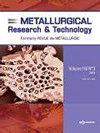Cyclic annealing versus continuous annealing of 20 wt.% chromium white cast iron
IF 1.1
4区 材料科学
Q3 METALLURGY & METALLURGICAL ENGINEERING
引用次数: 1
Abstract
To destabilize as-cast microstructure of 20 wt.% chromium white iron, cyclic annealing involving repeated austenitization for short duration of 0.6 h at 900, 950, 1000, 1050 and 1100 °C followed by forced air cooling is conducted as an alternative to continuous annealing requiring austenitization for longer period of 4–6 h at the said temperatures followed by furnace cooling. Continuous austenitization destabilizes the austenite matrix through precipitation of secondary carbides and transforms the alloy depleted austenite to pearlite on furnace cooling, thereby reducing the as-cast hardness from HV 669 to HV466. In contrast, repeated austenitization not only destabilizes the austenite matrix through precipitation of secondary carbides followed by its transformation to martensite on forced air cooling, but also causes disintegration of longer eutectic carbides to shorter segments with subsequent increase in hardness to as high as HV 890. Notched impact toughness after both continuous and cyclic annealing remains uniformly at 12.0 J as compared to as-cast value of 6.0 J. Besides, an unexpected rise in abrasive wear resistance after cyclic annealing treatment makes the alloy superior than that obtained by continuous annealing treatment as practiced in industries.循环退火与20 wt连续退火。%铬白口铸铁
使20wt的铸态组织失稳。%铬白口铁,在900、950、1000、1050和1100℃下重复奥氏体化0.6 h的短时间循环退火,然后进行强制风冷,作为在上述温度下需要奥氏体化4-6 h的长时间连续退火,然后进行炉冷。连续奥氏体化通过次生碳化物的析出破坏奥氏体基体的稳定性,使合金贫奥氏体在炉内冷却时转变为珠光体,从而使铸态硬度从hv669降低到HV466。相反,反复奥氏体化不仅使奥氏体基体析出次生碳化物,并在强制空冷条件下转变为马氏体,使基体不稳定,而且使较长的共晶碳化物崩解成较短的段,硬度随之提高到HV 890。连续退火和循环退火后的缺口冲击韧性均保持在12.0 J,而铸态时的缺口冲击韧性为6.0 J。此外,循环退火处理后的磨料耐磨性意外提高,使合金优于工业上使用的连续退火处理。
本文章由计算机程序翻译,如有差异,请以英文原文为准。
求助全文
约1分钟内获得全文
求助全文
来源期刊

Metallurgical Research & Technology
METALLURGY & METALLURGICAL ENGINEERING-
CiteScore
1.70
自引率
9.10%
发文量
65
审稿时长
4.4 months
期刊介绍:
Metallurgical Research and Technology (MRT) is a peer-reviewed bi-monthly journal publishing original high-quality research papers in areas ranging from process metallurgy to metal product properties and applications of ferrous and non-ferrous metals and alloys, including light-metals. It covers also the materials involved in the metal processing as ores, refractories and slags.
The journal is listed in the citation index Web of Science and has an Impact Factor.
It is highly concerned by the technological innovation as a support of the metallurgical industry at a time when it has to tackle severe challenges like energy, raw materials, sustainability, environment... Strengthening and enhancing the dialogue between science and industry is at the heart of the scope of MRT. This is why it welcomes manuscripts focusing on industrial practice, as well as basic metallurgical knowledge or review articles.
 求助内容:
求助内容: 应助结果提醒方式:
应助结果提醒方式:


